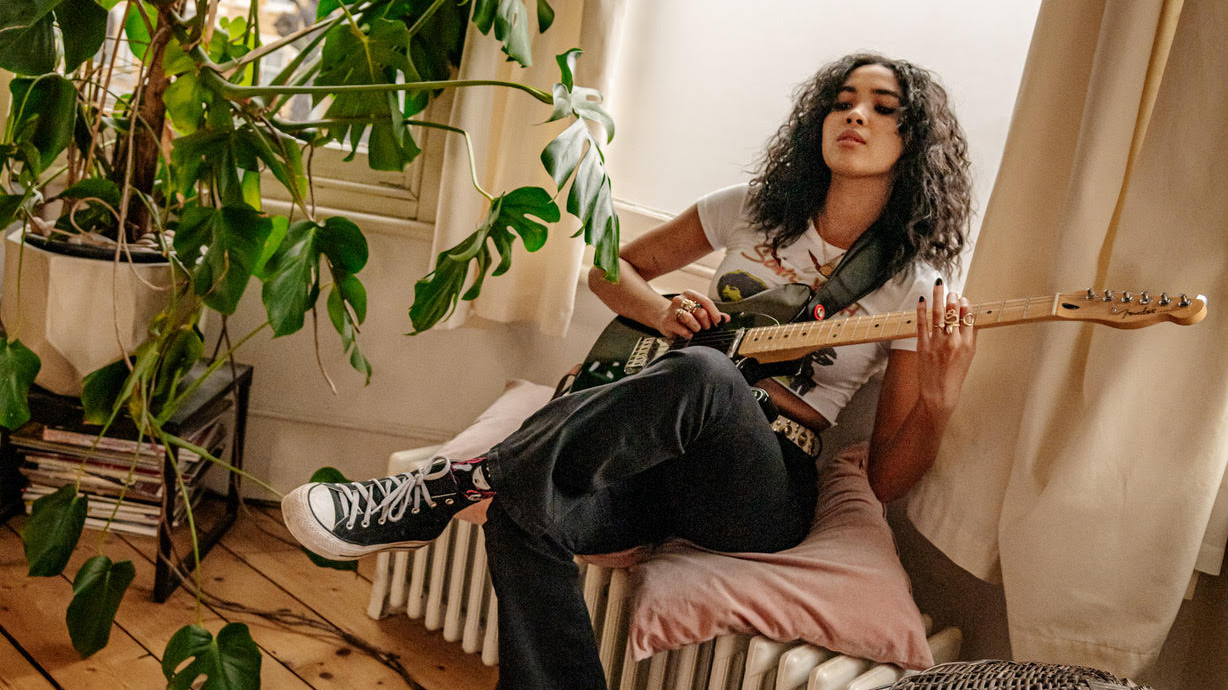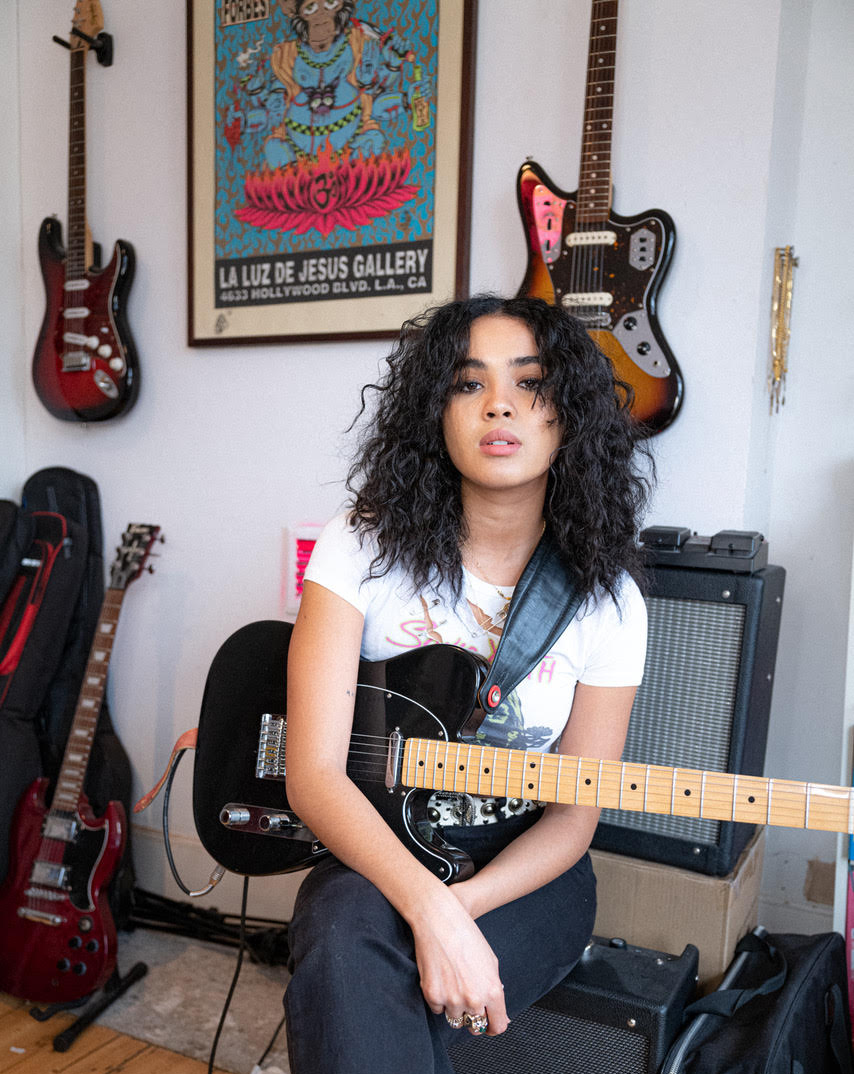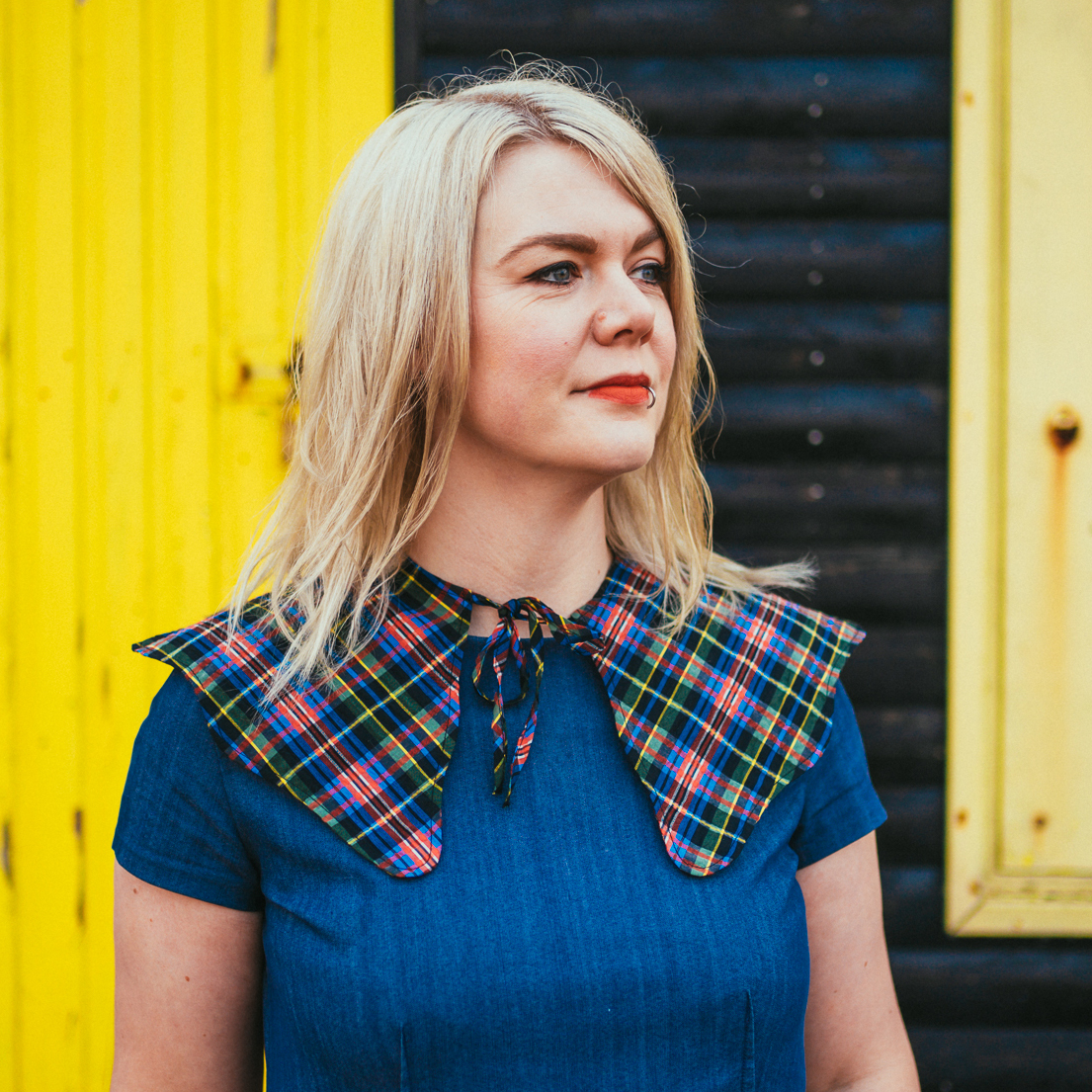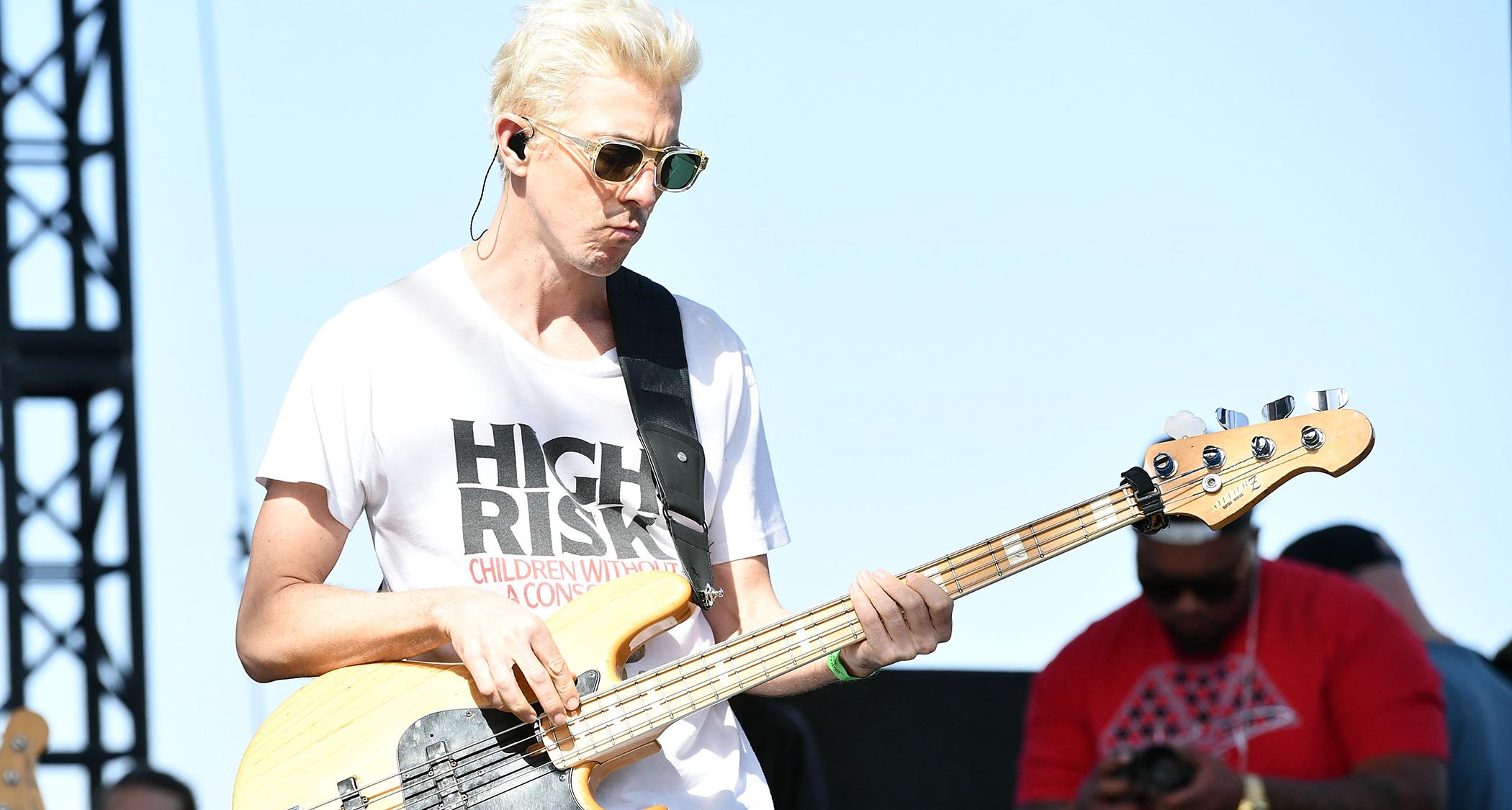Aziya: “It's not that there aren't female guitarists, it's that they're not being represented enough”
Ahead of her debut EP, We Speak of Tides, the 21-year-old musician and producer details her love of Fender Mustang amps, the guitarists who inspire her and joining H.E.R. for her Girls with Guitars series

All the latest guitar news, interviews, lessons, reviews, deals and more, direct to your inbox!
You are now subscribed
Your newsletter sign-up was successful
Last March, on the way towards a show at Brixton’s infamous Windmill, Aziya Aldridge Moore was forced to make an about turn. Pubs, clubs and venues were told to close “as soon as they reasonably can”. Yet despite the dystopian announcement surrounding her, the 21-year-old musician and producer’s spirits remained fairly buoyant.
Because while the rest of the world’s social spaces were dramatically decreasing, Aziya’s were on the up, having recently gained thousands of new supporters on her Instagram account, thanks in no small part to her incredible string of looped cover sessions.
Propelled by a seamless rendition of similarly innovative pedal pusher Grimes, over the past year Aziya has continued to conjure up odes to everyone from ‘80s mothership Kate Bush to this recent Nirvana gem (with a hat tip for that rim click).
A post shared by AZIYA (@itsaziya)
A photo posted by on
But Aziya isn’t just a one-take bedroom pop talent; she’s a skilled songwriter with a whole vault of her own hits waiting to be unleashed. The latest taste of which we received last month via single Blood, which, fittingly enough, featured a video that picked up right where she left off, as we find her navigating a frenzied night out at a club. As the music industry tentatively lets us back onto its dancefloors, Aziya is primed with arena-ready pop perfectly positioned for her imminent meteoric rise.
We caught up with the 21-year-old musician and producer to talk Mustang amps, modular synth making and the return of the mighty mosh pit.
You wrote your first song when you were just 10 years old on a small Spanish Chantry nylon-string acoustic guitar. When did you progress to electric?
"I got that [acoustic] guitar because I've always sung my whole life and my mum was like, 'Hmm, you obviously want to accompany yourself.' I started getting lessons and then from that, I would start making little songs. I fell in love with playing acoustic until going into college, then I made the switch. The sound and the music I was influenced by were very much changing. It was less soft and more intense, rediscovering bands like Led Zeppelin and then going into a further journey of listening to Ebo Taylor.
All the latest guitar news, interviews, lessons, reviews, deals and more, direct to your inbox!
"Why I enjoy the electric guitar is because there's more scope for you to be quite obnoxious and loud. I resonated with that when I read about Viv Albertine, because she talks about how she wasn't a guitarist. That sensibility of being like, ‘I don't give a fuck about what anybody thinks, this is my sound, it's really tinny and distorted and I love it.’"
You’ve spoken before about how you “didn’t have any guitar role models growing up”. Was that because of a male-dominated scene or not finding guitarists in the genres you wanted to create?
"When I started to play electric guitar, I realised I couldn't see a lot of female guitarists because I had all these male guitarists that were amazing in front of me, in the industry and the media. Someone asked me, ‘Why aren't there more female guitarists?’ It's not that there aren't female guitarists, it's that they're not being represented enough. So that's when I went down that rabbit hole of finding artists like Viv Albertine, Rosetta Tharpe, and June Millington [Fanny]."
Who are the inspirations for this latest EP, and how have they inspired your most recent sounds?
I was releasing covers, and I got this message from H.E.R.'s manager. And I was like, 'This is so fake, it's not H.E.R's manager DM-ing me – of course it's not’
"This EP was me solidifying where I wanted to start my sound. I was heavily influenced by a lot of psych-rock – Kevin Parker's production and Tame Impala. But then equally, really inspired by the Yeah Yeah Yeahs’ Karen O – her delivery is amazing. It's got a lot of energy, it's very soulful, but then there's also a lot of grit. But then also having undercurrents of really heavy, distorted bass. I was inspired by a lot of J Dilla's beats as well."
One of the incredible things to spark off your Instagram performance was joining Grammy-winning songwriter H.E.R for the Girls With Guitars live series. How did that collaboration happen?
"Oh my god. Shout out H.E.R. She is an amazing spirit and guitarist. It was bizarre because it was during that real dystopian period when no-one knew what was going on. I was releasing covers, and I got this message from her manager. And I was like, 'This is so fake, it's not H.E.R's manager DM-ing me – of course it's not.’ I ended up meeting her on the livestream, and that's why I say that she's got the most amazing presence, because I felt like I'd known her before, even though I was meeting her in front of thousands of people!"

What are some of the essential pieces of gear that you use to produce and create at home?
"I've got a Focusrite preamp, my Rode NT1-A microphone and then I have a shit-ton of hard drives and a Yamaha HS8 monitor. I've recently switched to a Novation [MIDI controller], which is good because I learned Ableton during lockdown and Novation works well for that. It's so much easier to trigger things because it's connected.
"My favorite guitar is probably my Jaguar. It was that moment in every guitarist's life where you don't see anything else. It's gleaming in the store. I have a Mustang amp which was lovingly given by Fender, which I use for live and if I do guerrilla live gigs because it's deceivingly light and has a lot of preset sounds so you don't need any pedals."
In between all the EP writing, recording, and producing and all those cover slots, you still found time to turn your hand to building a modular synth from scratch. Have you used it in a recording yet?
"Ha, there was nothing to do in lockdown! It's like adult Lego because all the steps are there, you're just bending things and knocking things into place. I didn't think it would make a sound so I'm really gassed it makes sound! I've been trying to double it up with some of my basslines to give a bit of top-end but I'm yet to get my grips with it."
Latest single Blood is a proper shout-it-out-across-the-festival-field anthem. What came first for you, the riff or the songwriting?
"That song was really interesting because I had a go at producing it so many times and it was only when I referenced and started revisiting Yeah Yeah Yeahs [that I finished it]. I listened to Rich – it's so riffy. [The riff] is almost the chorus. So while I worked mostly on acoustic, once I worked out the production and I re-listened to Rich, that's when things started coming into play."
You’re celebrating the release with a sold-out show at Paper Vintage Dress in London. How does it feel thinking about what you’ve achieved over the past 18 months with a full EP and tons of BBC Radio 1 airplay under your belt?
"Lockdown really helped me to hone in on my craft and practice, produce a lot more, and have more time to get the mixes right on the EP. To the point where now I'm coming out of it, I don’t think I could be more proud of this first piece of work. I've got a band and now we're all just itching to play. It's just a continuation of where we left off. Live is so important to me. I want to be seeing people mosh at my gigs and singing along, because they're supposed to be anthemic songs."
- We Speak of Tides arrives July 2 via Platoon.
Cheri Amour is a writer, editor and broadcaster intent on amplifying the voices of women and non-binary artists in print, online and on air. During her twenties, she played lead guitar in a touring two-piece, sharing the stage with The Slits and John Peel-approved punks The Nightingales. Formerly Deputy Editor at TGA Magazine, Cheri headed up its Tech section pouring over pedals with everyone to indie icon Debbie Smith (Echobelly/Curve) to multi-instrumentalist Katie Harkin (Sleater Kinney/Waxahatchee/Wye Oak). She's currently working on an upcoming 33 1/3 book on the unassuming influence of South Bronx sister troupe ESG, out in Spring 2023.

